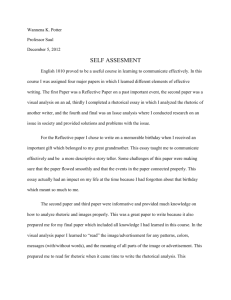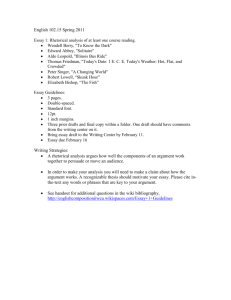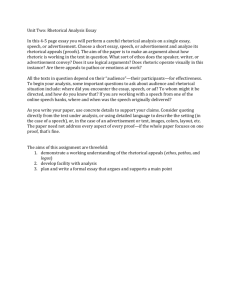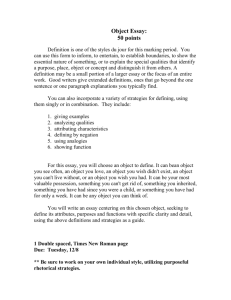Welcome to English 3 AP Language & Composition
advertisement
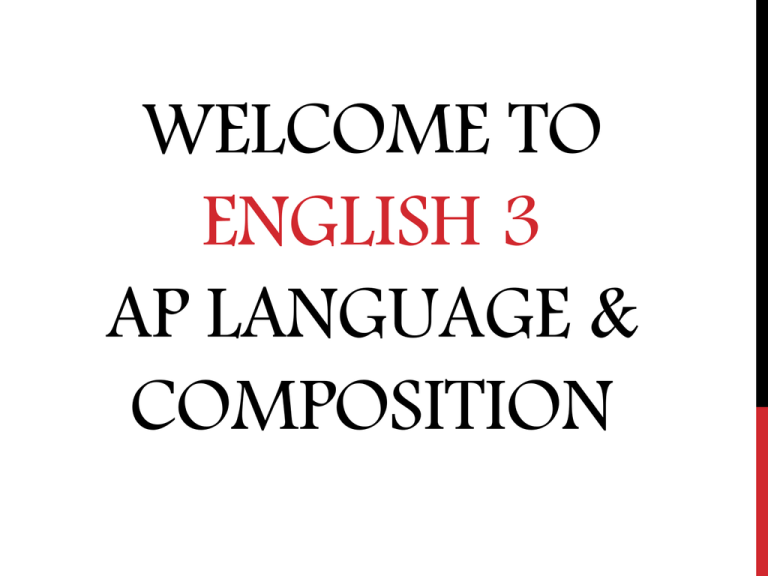
WELCOME TO ENGLISH 3 AP LANGUAGE & COMPOSITION WHAT IS AP LANGUAGE? What it is NOT: What it is: • English 3 Honors • A college-level course • A British Literature course like the other classes • A class that requires close reading (and a lot of it!) • A class that requires a lot of writing • A class that prepares you to take the AP exam in May • A class that teaches you about rhetoric • A class that requires grit, integrity, hard work, curiosity, and responsibility. • Literature-heavy • Easy • boring WHY TAKE THE CLASS? The purpose of this class is to garner you college credit so you can test out of your first year of English. A secondary purpose is to provide you with rigorous training that will, no doubt, help you succeed in college. A tertiary purpose is to provide you will advanced critical thinking skills, reading skills, communication skills, and writing skills to help you in your career. WHAT DOES THE TEST COVER? Simply, the exam evaluates your reading and writing skills. *This does NOT mean just your comprehension skills. That’s really basic! *Rather, it tests your ability to analyze how authors use various techniques to convey meaning, and it tests your ability to create & convey your own argument or meaning. WHAT IS THE FORMAT OF THE TEST? *Read various nonfiction articles or passages and answer about 10 multiple-choice questions about each text. *These questions include concepts such as author’s purpose, tone, rhetorical devices, grammar, etc. *Three essays: *synthesis essay (an essay in which you take a position on a topic and incorporate various sources into your argument. *analysis essay (an essay in which you analyze the rhetorical strategies that the author of a passage uses. *persuasive essay (an essay in which you support, refute, or qualify the opinion stated by the author of a passage. HOW WILL ALL OF THIS BE LEARNED? The year is divided into five units of study: Unit 1: Introduction to the course, annotation, close reading, and analysis • Use LOTF • Acts as a bridge from sophomore year literature course to the language course. • Introduce elements of writing that can be used in almost any writing situation. HOW WILL ALL OF THIS BE LEARNED? Unit 2: Analyzing Rhetoric• Introduce & recognize rhetorical terms • Analysis of other people’s use of the terms • Introduce visual analysis • Selfie Project • Read Macbeth • Rhetorical analysis paper on Macbeth HOW WILL ALL OF THIS BE LEARNED? Unit 3: Employing Rhetoric Part I • Investigate rhetoric by focusing on the human condition with an emphasis on the individual’s personal experience. • Introduce rhetorical modes • Mini project • Read Night • Rhetorical modes essay: “How do we become who we are?” HOW WILL ALL OF THIS BE LEARNED? Unit 4: Employing Rhetoric Part II • Develop your own rhetorical voice. • Employ rhetoric to comment upon the world. • Learn about satire • Audience project • Argument essay HOW WILL ALL OF THIS BE LEARNED? Unit 5: Synthesis • Culmination of everything learned • Synthesize multiple sources into one cohesive argument • Synthesis essay • Take the AP exam in May QUESTIONS, COMMENTS, CONCERNS?


